Potty Training Regression: 5 Tips to Get Back on Track
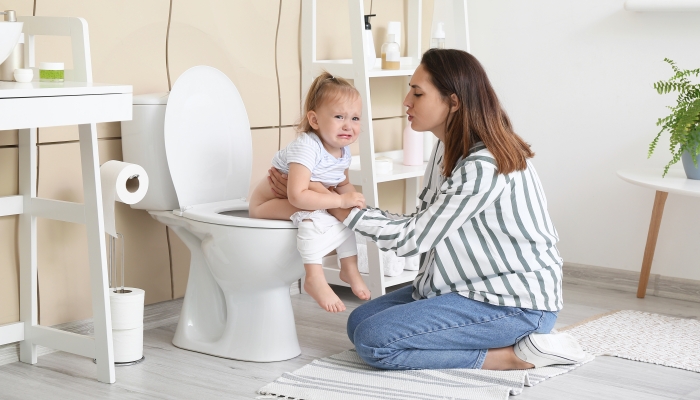
- Potty training regression occurs when a fully potty trained child starts to have persistent and consistent accidents.
- Regressions are caused by medical, developmental, or psychological factors.
- Remaining calm and following simple tips, parents can create a plan to help a toddler quickly get back on track.
You’ve spent weeks or months focused on your child’s bathroom routine. You, and your kid, are finally feeling confident. Your toddler has made it several weeks, months, or even a year with no accidents and you feel successful. Your kid is officially potty trained!
You find yourself so comfortable you don’t even think about potty training. Using the toilet has become a well-learned skill. You find yourself able to focus on other things.
And then you notice accidents start to happen again. At first, you may think it was a fluke, but more mishaps occur. They start to happen consistently. You feel baffled. You were certain your child had mastered potty training. What’s going on?
If your child is doing well with toilet training and suddenly has several accidents, you may be experiencing potty training regression. Although disheartening, regression is standard for potty-trained children.
Know different ways to support your toddler and when to rule out medical concerns. This can help reduce the length of regression and reduce your laundry load.
Signs of Potty Training Regression
Regression is returning to a previous or less developed state. For toddlers, it looks like reverting to a baby stage of development and behaviors. It may feel like your kid forgot everything they learned.
Developmentally, children learn in small increments. Learning is not linear. While in the middle of potty training, kids might do well for a few days, regress, and then do well again. It is normal for young kids to start to master a skill and then lose those learned skills for a short period.
Potty training regressions occur after a child is successfully potty trained for an extended period of time. If your kid has a few successful days of potty training and then a few accidents, this is not a regression. According to the American Academy of Pediatrics, accidents are a normal part of the potty training process.
During potty training regressions you may notice your potty trained child:
- neglecting potty practices
- having persistent, consistent accidents
- requesting to use diapers
- using baby talk or wanting to be held more
A toddler may regress in potty training due to several concerns. Finding the underlying cause for regression can help you focus on a plan of action to help your child get back on track.
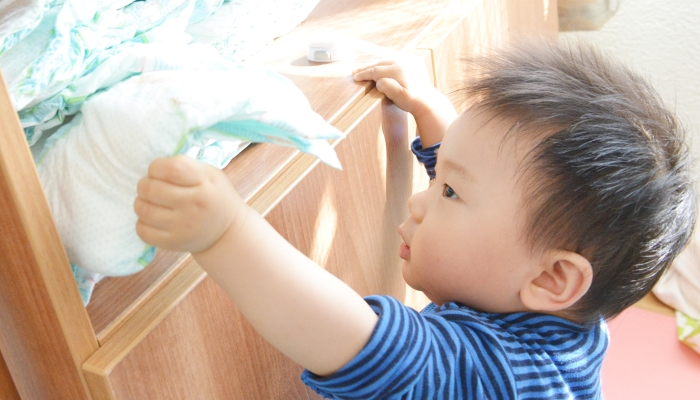
What causes regressions with potty training?
Medical, developmental, or psychological concerns can cause a toddler to have setbacks in potty training. If your child is having inconsistent accidents, several dry days or weeks and then a few days of mishaps, there may be a medical concern to address.
Medical reasons for Potty Training Regression
It is best practice to first consult with your child’s doctor if you are noticing sudden accidents with your potty-trained child. This will allow you to rule out or treat possible medical issues that are causing your kid to have uncontrollable accidents.
Urinary Tract Infections (UTI)
A urinary tract infection (UTI) can cause an increase in urination in addition to pain. An individual with a UTI may need to use the potty frequently or may not even know they are peeing. Once diagnosed, UTIs are easy to treat.
Constipation
Constipation increases the chances of a potty-trained child having an accident.
The intestines are close to the bladder. A child with full bowels may experience more pressure on their bladder, causing either a frequent need to go or accidents.
A child with infrequent bowel movements may avoid going to the bathroom because they fear it will hurt. Ongoing constipation sometimes leads to encopresis, the involuntary passing of stool.
A medical professional can complete a physical exam, or order imaging tests, to check for constipation. If your child is constipated your doctor may discuss focusing on nutrition, physical exercise, or increasing water intake. If more severe, medication might be an option.
Diabetes
Childhood type 1 diabetes can cause an increase in urination. Know the warning signs of childhood diabetes and if you’re concerned, consult with your doctor immediately.
Developmental Reasons for Potty Training Regression
A child may appear to successfully potty train and then regress due to developmental concerns, meaning the kid isn’t ready to potty train, yet.
These developmental issues may include:
- Attention Deficit Hyperactivity Disorder (ADHD)
- Autism Spectrum Disorder (ASD)
If your child has a developmental reason for potty training regression, creating and sticking to a potty training schedule can help your child be more successful. This will help prevent children from getting too distracted and forgetting to go to the bathroom. Utilizing a potty training chart can also help with consistency and motivation.
Psychological Reasons for Potty Training Regressions
If there is no physical or developmental concern for regression it is likely your child has regressed due to changes in their environment, a traumatic experience, or other stressors.
Some children start having accidents due to:
- Pregnancy or new baby
- New sibling
- Starting a new school or daycare
- Moving to a new house
- Starting a new routine
- Fear of missing out
- Not being ready to potty train
- Recent death
- Parents’ divorce or tension in the relationship
Significant changes in your child’s life, even positive changes, can cause stress for your toddler. Recognizing and understanding the impact of change on your child can help reduce stress, and eventually accidents.
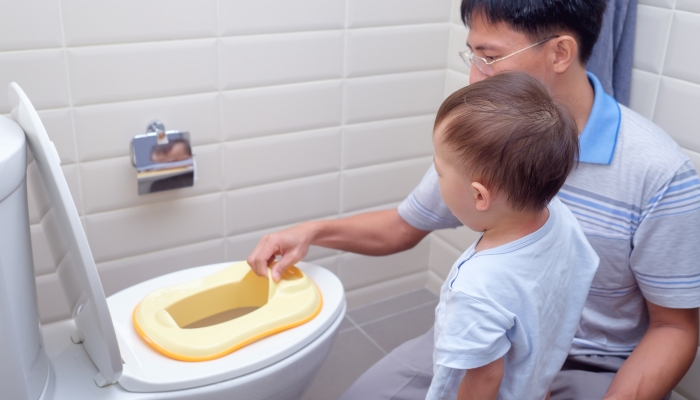
How To Help Your Child with Potty Training Regressions
Sudden accidents and more wet underwear can be frustrating and overwhelming. Having a plan to deal with this setback will help get your child back on track. Following these steps can help guide your young child to dry underwear and ongoing success using the toilet.
1. Remain Calm
Take a deep breath and respond calmly when your child has an accident. When an accident happens, remind yourself that this is a minor setback. Although frustrating, your behavior can directly impact the progress and success of toilet training.
Toilet training is a complex, emotional process. Remaining calm and having patience will help your child regain the skills and confidence to use the potty regularly again.
2. Consult With Your Doctor
Remember, if your child has a potty training regression, it’s important to first consult with your pediatrician. Rule out any physical or developmental causes for sudden accidents. If you are worried that maybe your child wasn’t ready to potty train yet, discuss the best potty training age to try again in the future.
3. Practice Empathy
All behavior is communication. During a regression, your child is trying to communicate something to you. Developmentally a child cannot express complex emotions. Children tend to regress to infantile behaviors to feel safe and secure.
When you take the time to understand why your child is having accidents, you can approach the situation with more empathy.
If your child’s potty training regression is due to health or developmental concerns, your pediatrician will prescribe specific treatments to best help. When an accident occurs due to medical or developmental concerns, acknowledge how hard this must be for your child. Offer verbal support and understanding that they are trying but may be medically unable to help it.
When your child’s potty training regression is related to psychological factors, take the time to discover and acknowledge the particular stressor or life change that is impacting their progress.
When big changes are occurring, set aside special time for your young child. Talk about the changes openly and offer emotional support.
4. Offer Gentle Reminders-Don’t Punish
Instead of punishing a child for an accident, remain calm and offer a gentle reminder. Tell your child, “Remember, potty goes in the toilet,” and then gently help them clean up.
Acknowledge the times your child successfully uses the toilet and offer praise. Remain confident that they can be successful. Try to avoid going back to a diaper if at all possible. Tell your kid that they can do this.
If your kid is insistent on the diaper and really struggling, consider offering a toileting break for a few days to reset. During this time, cuddle your toddler and offer the security they are seeking.
Although your child has successfully potty trained already, focus on potty training rewards. Positive reinforcement, particularly praise, can encourage kids to continue to do well.
5. Go Back to Basics
Sometimes starting at the beginning can help remind children of the skills they already learned. Focus your energy on the process of potty training again. Freshen your memory on potty training methods and share your plan with your family.
Offering a more structured and consistent routine can help get your child back on track.
How Long Does Potty Training Regression Last?
Once you identify the cause of the regression and focus on a consistent plan, your child should be back to normal pretty quickly. When handled calmly and promptly, regressions typically last just a few days or weeks.
In no time, your toddler will be back to dry underwear and play!
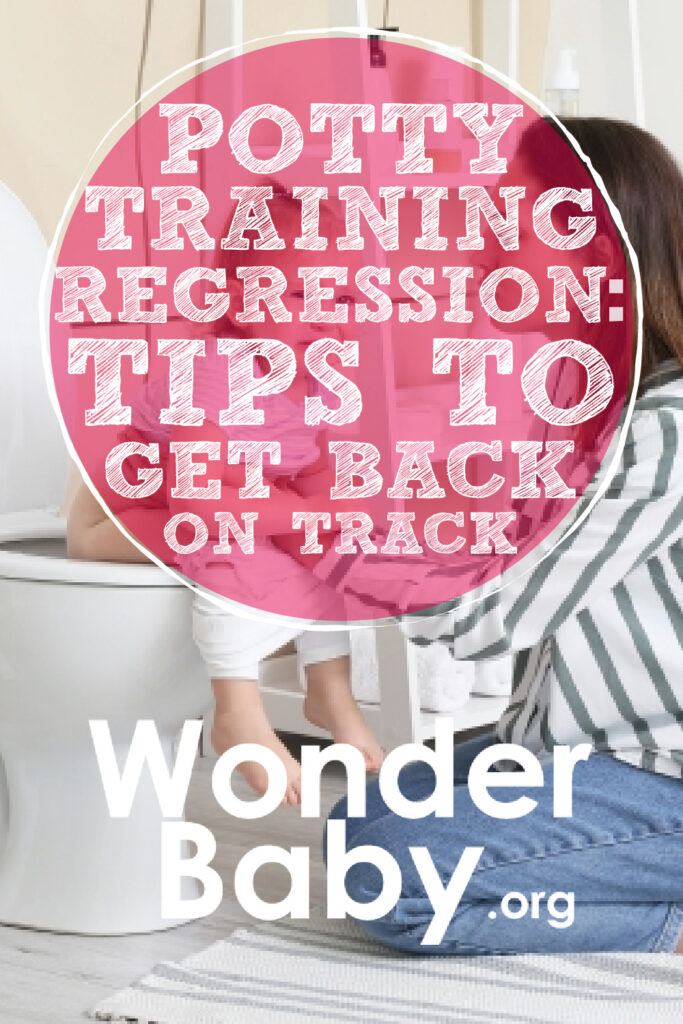
The information WonderBaby provides is not intended to be, and does not constitute, medical or other health advice or diagnosis and should not be used as such. Always consult with a qualified medical professional about your specific circumstances.
Related Posts
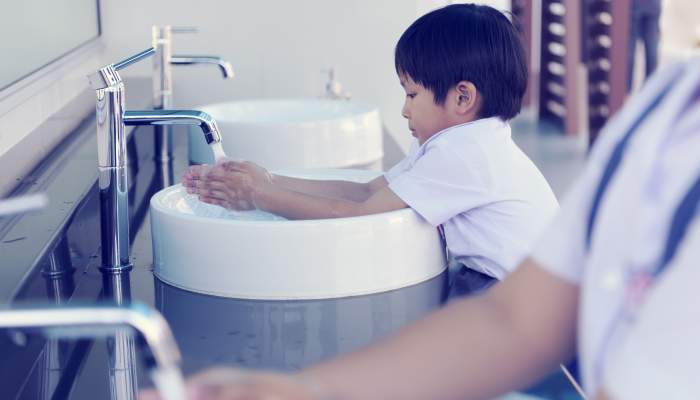
IEPs, Potty Training
7 Sample Toileting IEP Goals
Toileting IEP goals should address the specific needs and abilities of each child. Be flexible and patient as your child works on their toileting skills.
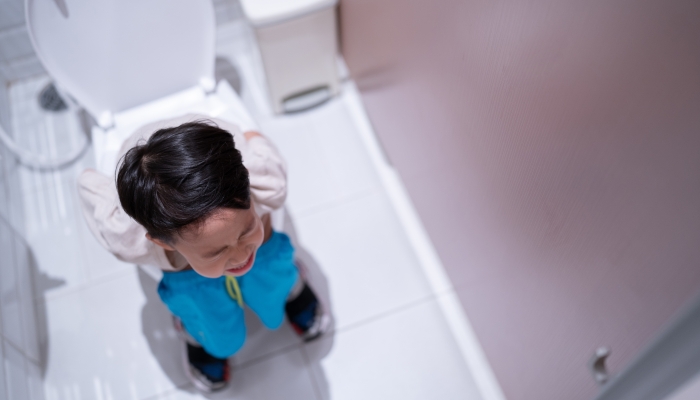
Potty Training
How To Deal With Constipation When Potty Training
Constipation is common amongst children of potty training age. Many children suffer from potty training constipation, but there are things you can do to help.

Potty Training
5 Potty Training Games To Make Potty Training Fun
Learning to use the toilet doesn’t have to feel like hard work. There are lots of potty training games you can play with your toddler to make learning fun.